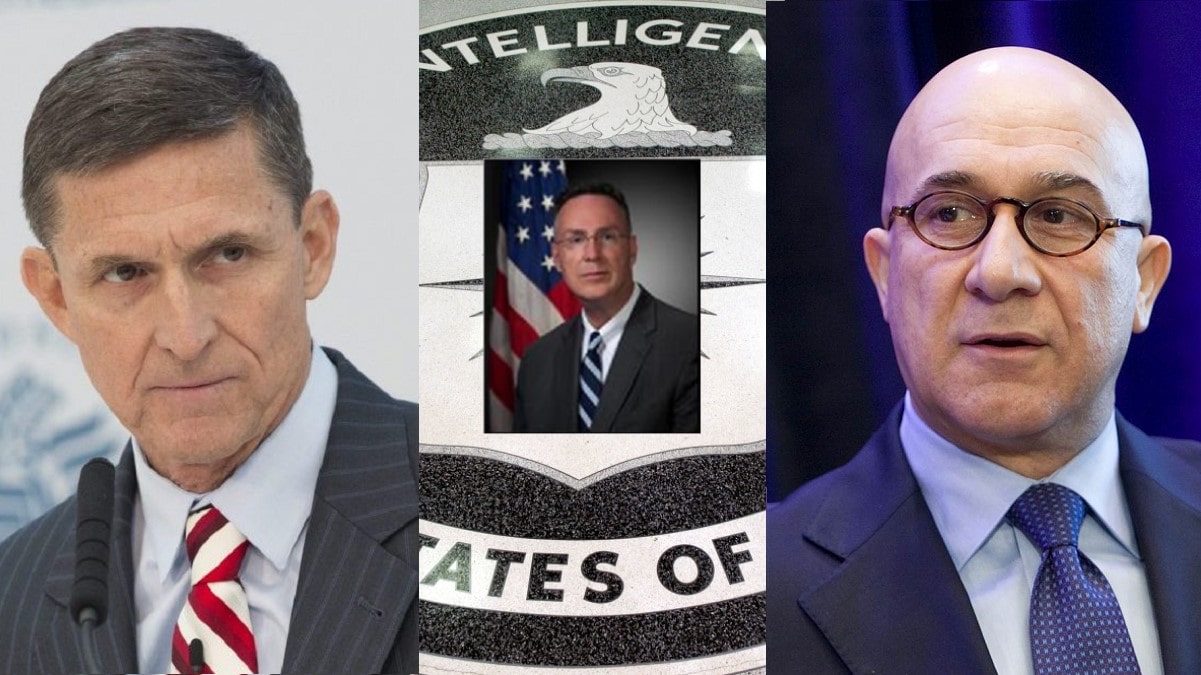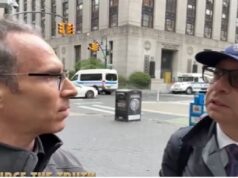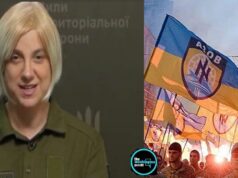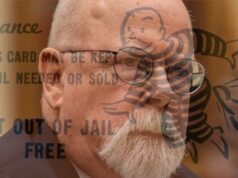As recently reported by TWP, a three-judge panel of the 4th Circuit recently overturned a lower court decision in the trial of Bijan Kian (referred to as Bijan Rafiekian in court filings) related to the Flynn Intel Group for violations of the Foreign Agents Registration Act (FARA) for work related to Turkey. U.S. District Judge Anthony J. Trenga, who oversaw the trial, had ruled,
[T]he Government failed to present substantial evidence for a rational juror to find beyond a reasonable doubt that Rafiekian knowingly participated in a conspiracy.
From Judge Anthony Trenga’s September 2019 ruling setting aside the guilty verdicts in Bijan Kian’s trial
Judge Trenga granted the defense’s Motion of Acquittal and also laid out four separate reasons that would justify a mistrial in the case and conditionally granted a Motion for New Trial.
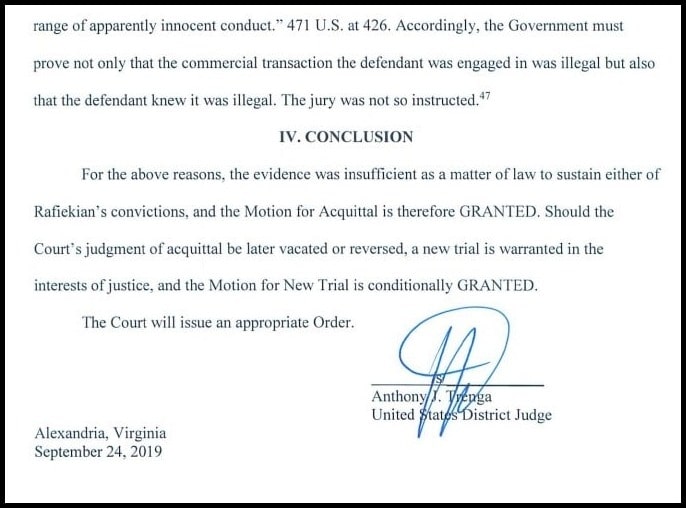
The 4th Circuit with two Obama appointees found reasons to not just overturn the ruling, including all four grounds to grant a mistrial, but also to order Judge Trenga to move straight to sentencing with no further consideration in the case. The judge that actually oversaw the trial and believed Kian was innocent is now being ordered to convict the man he believes is innocent in what experts say is a very rare ruling.
So before the district court is forced to sentence a 69-year-old man to federal prison for most or all of the remainder of his natural life, TWP felt it necessary to reexamine some of the key testimony the government used to convict Kian guilty beyond a reasonable doubt in a highly complex and politized criminal trial after only three hours of deliberation by a D.C. area jury; namely the testimony of former Federal Bureau of Investigation (FBI) Deputy Asst. Director Brian McCauley.
McCauley identified himself in testimony as having worked as an FBI special agent from 1997 until he retired in 2015. He also mentioned at one point working as a Secret Service agent as far back as the Reagan administration. What he neglected to mention is he appears to have worked with the Central Intelligence Agency (CIA) for the majority of his time in government and apparently has close ties to former FBI Director and Special Counsel Robert Mueller.

The National Clandestine Service (NCS) is the undercover arm of the CIA and has authority over all clandestine operations throughout the world that concerns the nation’s intelligence community. The mission of the NCS is described as,
The CIA’s elite corps of experts is called upon to conduct clandestine missions worldwide. This is accomplished by collecting human intelligence (HUMINT) that is then used by the President, senior policymakers, and the military in strategic decision-making. This supports the CIA’s mission to strengthen national security and foreign policy objectives through the collection of human intelligence and covert action.
While it’s not clear that McCauley was acting as a Clandestine Service officer during his tenure at the Flynn Intel Group, there is no doubt that he enjoys close ties to people like former Director John Brennan who have a clear interest in Kian being portrayed as a foreign agent. One source (which TWP has not been able to independently confirm) went as far as to describe Brian McCauley as,
The right-hand-man to John Brennan, former Director of the CIA
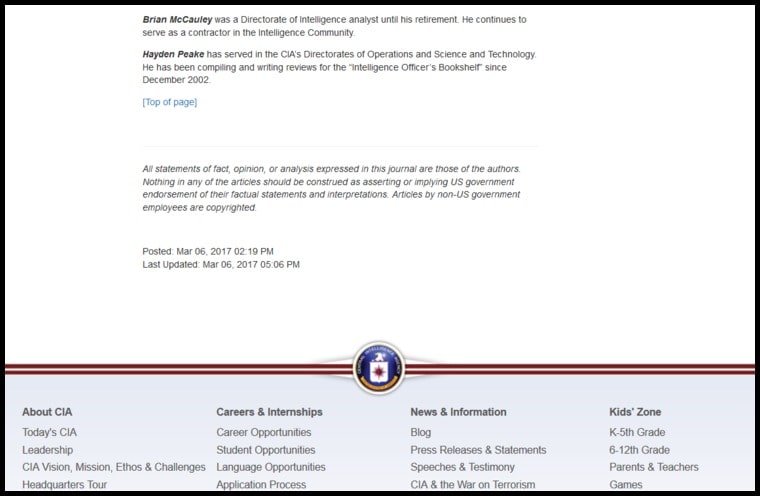
McCauley wrote a letter to the editors of the professional journal CSI (Center for the Study of Intelligence) in December 2016 where he gave details about his early career in the CIA. He states his, “first account as a CIA analyst was covering Soviet policy toward East Europe (1978–81)”. That means he began his CIA career right about the same time John Brennan entered the agency (1979). It is highly doubtful McCauley would have been appointed to such a high-ranking and sensitive position as Associate Deputy Director of the NCS in charge of HUMINT (Human Intelligence) and reporting directly to Brennan and FBI Director Jim Comey until late into the Obama administration unless he had close ties to Brennan and was viewed as a trusted ally. So a description of McCauley as Brennan’s “right-hand-man” seems plausible if not likely.
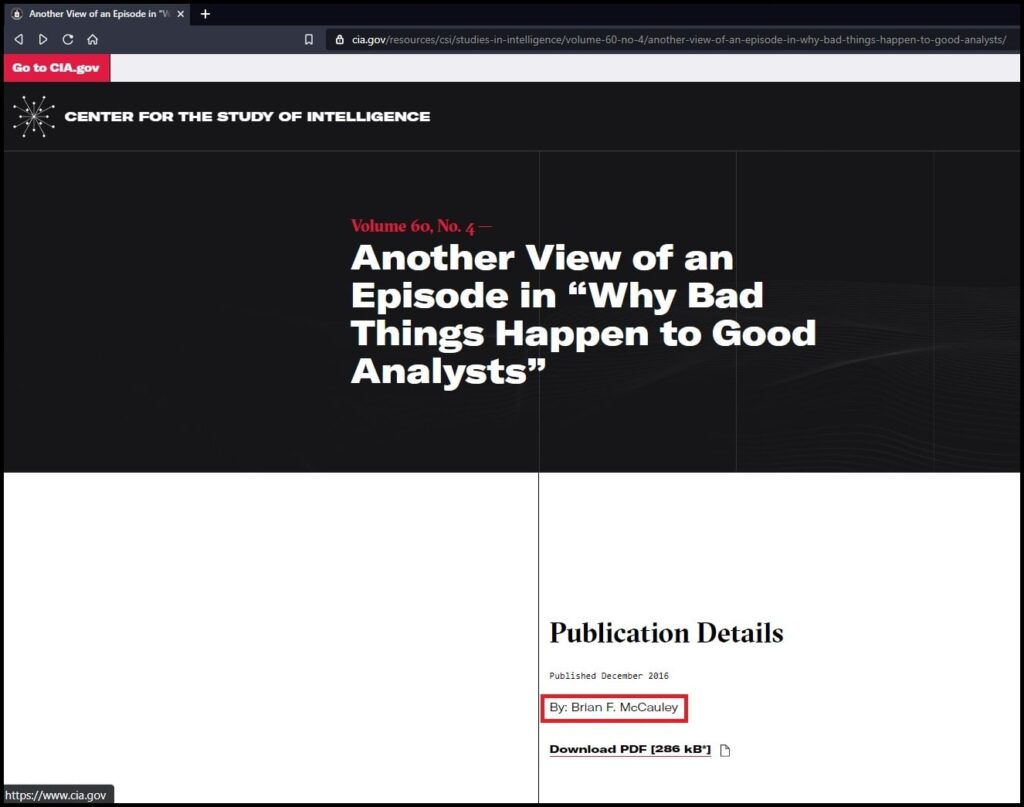
I was a CIA careerist
Quote from Brian McCauley’s December 2016 letter to the editors of CSI
As if all that was not enough to send up red flags about the motivations behind McCauley’s damning testimony, he is also directly implicated in the Hillary Clinton email scandal in an alleged “quid pro quo” scheme between himself and Obama’s Undersecretary of State Patrick Kennedy to get the classifications changed on certain emails to and from Secretary of State Clinton presumably to shield her from possible prosecution.
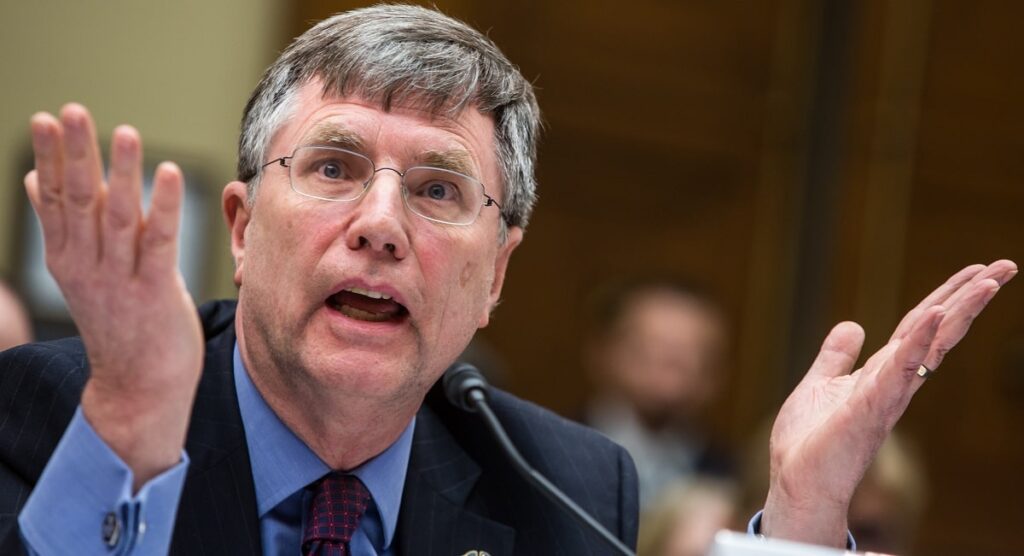
The first thing that struck me from reading the transcript of McCauley’s testimony in Bijan’s trial was an account he gave of a November 2nd, 2016 meeting he attended along with Bijan where the Flynn Intel Group (FIG) made a presentation to a client and Bijan’s co-defendant K. Ekim Alptekin.
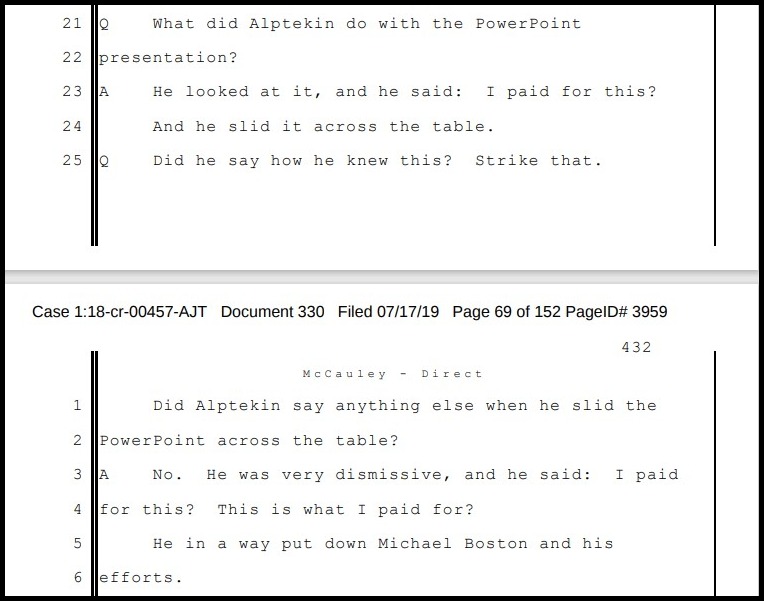
I, myself, have interviewed Alptekin on several occasions, and this portrayal of a cold, dismissive, and condescending individual is not a side of him I have ever personally witnessed. It struck me as being very out of character of what I know of him. But maybe that is just my own experience, or he carries himself differently with members of the media than he does in business.
Let’s consider Alptekin’s position in the international business world though. At the time of his private business contract with the Flynn Intel Group, Alptekin was the chairman of the Turkey-U.S. Business Council (TAİK) and still sits on their Executive Board today.
He has been elected by his peers in the Turkish business community to head a trade organization representing over 70% of Turkey’s GDP. His primary charge is to foster business relationships between Turkey and the United States. Alptekin has served as an Honorary Consul of the Republic of Albania which means he was nominated by an Albanian Minister of Foreign Affairs to represent Albania, a NATO member country. A reference letter written by late Democratic Congressman Tom Lantos describes Alptekin as
Someone with a high level of diplomatic aptitude and adds that throughout his impressive career, few young men have impressed me as much as Alptekin.
~ the late Congressman Tom Lantos (D-CA)
Alptekin has never worked for the Government of Turkey, but as head of a bilateral trade organization, he would work hand in hand with the diplomatic community including attending regular annual meetings at the United Nations Headquarters in New York. He is a diplomat at heart and carries himself as such.
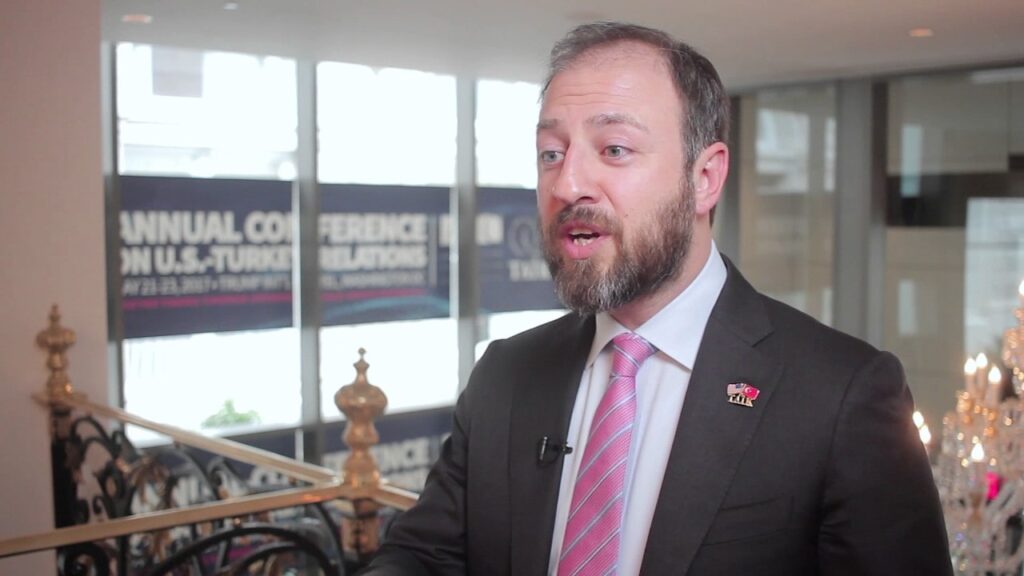
Turkey has the second largest standing army in NATO with a large defense industry and here is the chairman of TAiK sitting in a meeting with high-level members of the U.S. military and Intel business communities including a top national security advisor to the Republican nominee for President of the United States and a former governor of the U.S. EXIM Bank among others. This is probably the type of meeting he spends a good part of his time attempting to arrange just in order to network, and he is going to take this opportunity to be condescending and dump all over the attendees? Even if he was unhappy with the work product, is he going to be so coarse that no one in attendance would ever want to suffer through a meeting with him again and would advise their own business contacts to stay away? Could he even get elected into a position such as chairman of TAiK in the first place if this was in his nature? Does that make any sense?
Just from my personal interactions with Ekim, I would describe his demeanor as jovial, lighthearted, and deferential almost to a fault. Allow me to give two contemporaneous examples from public interviews he has given recently to demonstrate what I mean.
In the same interview he had on UncoverDC with Tracy Beanz last August, Ekim went off on a bit of a rant responding to outlandish and easily debunked allegations made about him and the Flynn Intel Group by former CIA Director James Woolsey (that we will discuss in greater detail later in this article) regarding a supposed kidnapping plot Woolsey had overheard in a meeting. Notice how even though he’s obviously annoyed and agitated about the claim being made against him, he somehow maintains a positive tone, and casts humor into the situation.
In a separate example, during the first public interview he gave about his case back in May 2020 to Mike Doran on his Counterbalance podcast, Alptekin talked about the toll the Mueller Investigation had taken on him and his family. Notice at the 1:11 minute mark of the clip below how he goes out of his way to be deferential to the prosecutors involved in his case. Keep in mind, he is speaking about people like Brandon Van Grack and other members of the Mueller team who have used every corrupt means possible to destroy his career, his family, and reputation all in an effort to prosecute General Flynn and President Donald Trump by extension.
TWP reached out to Mike Doran for comment who is a Senior Fellow at the Hudson Institute and has known Ekim for years, interviewed him on multiple occasions, attended numerous Turkish-American business conferences, and is much more familiar with personality and demeanor for a second opinion of McCauley’s characterization of Alptekin in testimony. Although Doran was not in the meeting and only has only heard secondhand accounts of what took place, but stated after reading McCauley’s account,
It’s hard for me to imagine he’s describing the person I know.
~ Michael Doran, Senior Fellow at the Hudson Institute
Both instances give a good illustration of Ekim’s demeanor in every interaction I have ever had with him and those who know him more personally have described to me. Once you conclude the man McCauley is describing is not Alptekin and his recounting of the FIG meeting is a gross mischaracterization, it calls into question the rest of McCauley’s testimony. What else is he embellishing, distorting, or just flat-out making up? Let’s examine some of the other questionable portions of his testimony.
McCauley’s retelling of his work on Project Confidence does not seem to line up with the timeline of the documented evidence. As detailed in TWP’s prior reporting, Project Truth was the name given to a proposed lobbying effort by the Flynn Intel Group that drew some interest from Turkish cabinet-level ministers, but which the Government of Turkey ultimately passed on.
Project Confidence, which McCauley was hired as a contractor by the Flynn Intel Group, was a private lobbying effort Alptekin himself hired FIG to perform in August 2016. After the Turkish government passed on Project Truth, Alptekin hoped this would provide “proof of concept” that he could then use to convince the Turkish government with “Confidence” (hence the name) that investing more in the United States on their own lobbying efforts would be worthwhile.
In September 2016 during a regularly scheduled annual meeting at the United Nations, Alptekin arranged an impromptu “meet and greet” at UN Headquarters since the parties were already present. At Alptekin’s insistence, some Turkish government officials and the Flynn Intel Group agreed to the introduction, more to placate Alptekin than anything. But their engagement never went further, and the existing Project Confidence commercial contract the Flynn Intel Group had with Alptekin’s Dutch company Inovo BV was never discussed as was confirmed by all participants.
The meeting between FIG and Turkish officials McCauley described took place on September 19th. McCauley testified in the days after the meeting, he was called back into the FIG office and told by Bijan, “we got the contract”. The implication being the meeting with the Turkish officials had gone well and the Government of Turkey had decided to move forward and hire the Flynn Intel Group.
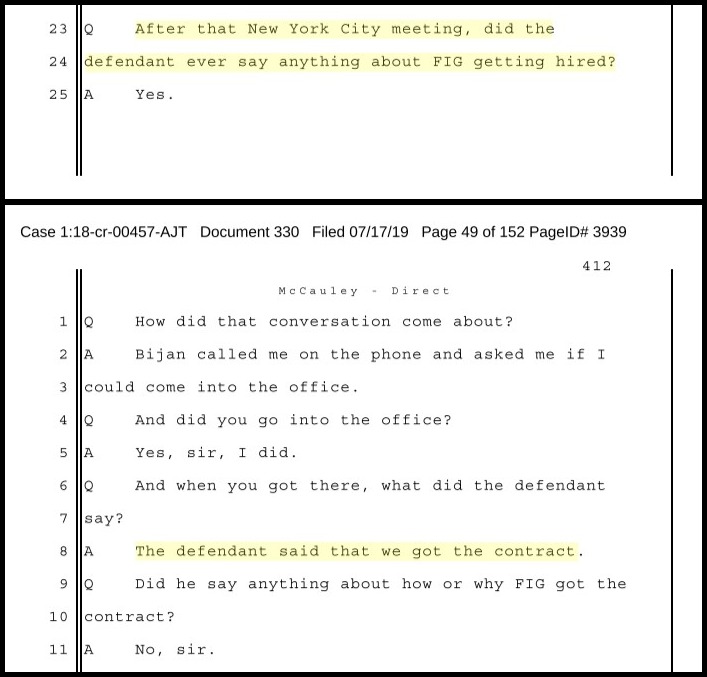
So according to McCauley, FIG only got the greenlight to move forward with their illegal secret mission to work as an agent on behalf of the Government of Turkey in late September, with just barely over a month before the U.S. Election Day on November 3rd. McCauley goes out of his way to link the UN meeting with the Turkish officials to the start the engagement, thereby implying FIG must really have been working for the Turkish government. A point he made clear when recounting a conversation with Bijan in the hotel immediately after the meeting in New York.

McCauley was claiming Project Confidence was going to need to be a “rush job” having to somehow squeeze a 90-day project into a 45-day time window to wrap up before Election Day. A point he reiterated in his testimony about his conversation with Bijan the day FIG “got the contract” in late September after the UN meeting. McCauley presents this as the starting point when Bijan told him to “build a team”.

None of this makes sense in comparison to the other witness testimonies and evidence in the prosecution’s case. The trial transcript is littered with references to Flynn Intel Group activity throughout August and early September related to work on Project Confidence. The witness who was on the stand immediately ahead of McCauley, FBI forensic accountant Grant Smith, was asked to verify several documents that directly refute McCauley’s version of events. Smith was presented with email evidence (again by the prosecution to a prosecution witness) referencing the budget for the 90-day Project Confidence campaign as far back as August 11th; well over a month before McCauley claims FIG was given the greenlight.
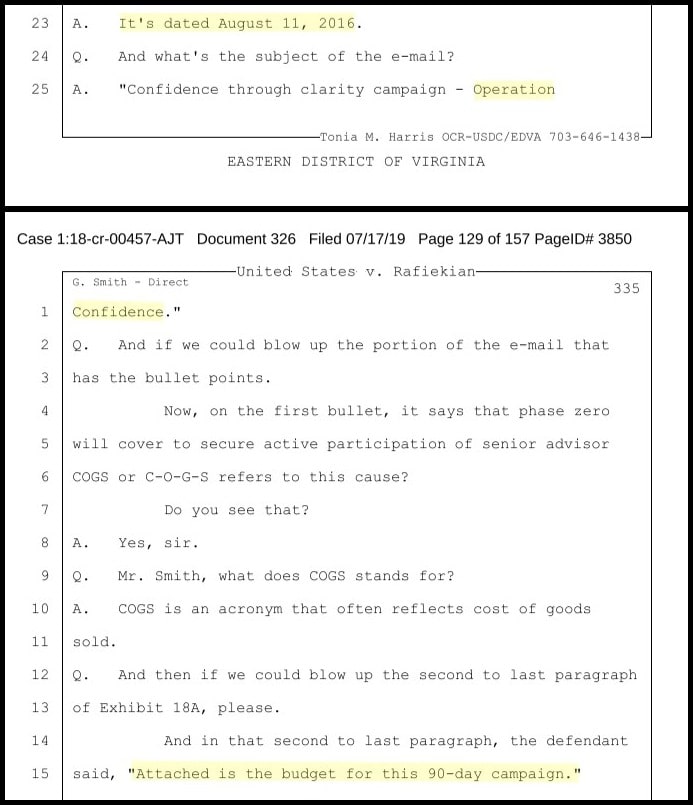
In the prosecution’s opening statement in the trial, they themselves lay out the Flynn Intel Group had a signed engagement letter with Alptekin’s company Inovo BV for a 90-day Project Confidence private contract for a payment of $600,000 no later than September 3rd, nearly three weeks before McCauley testified FIG “got the contract”.
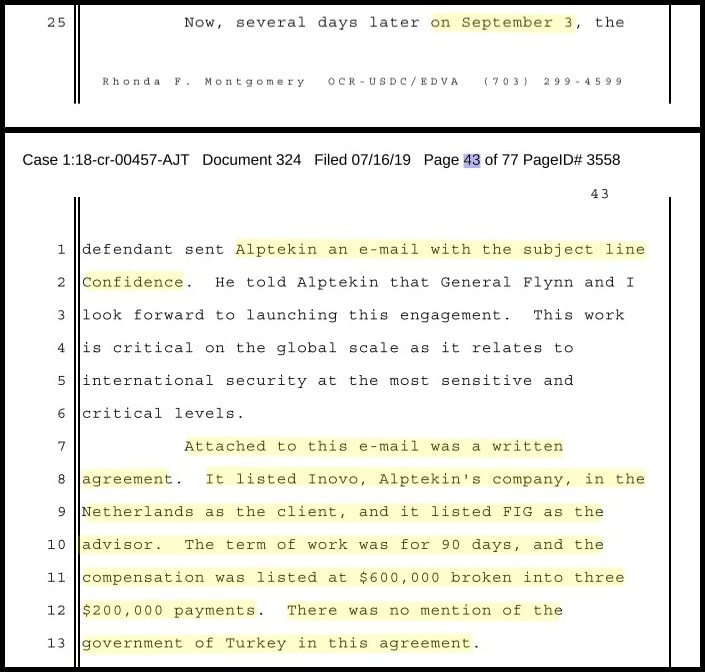
The FBI forensic accountant also confirmed the first payment by Inovo BV to the Flynn Intel Group occurred on September 9th, about two weeks before McCauley said FIG “got the contract”.
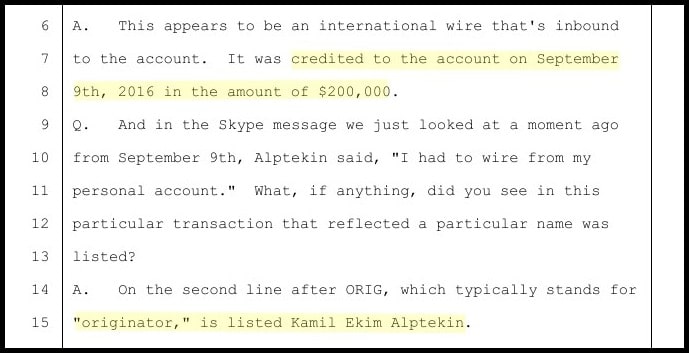
It should be noted payment would only be made once Inovo was invoiced by the Flynn Intel Group, and invoicing for professional services are typically invoiced after the services are performed. The FBI forensic accountant confirmed the second payment was made on October 11th, and the third and final payment on November 14th, so roughly two weeks after the November 2nd meeting at the FIG offices when Alptekin was presented with the final work product for Project Confidence.
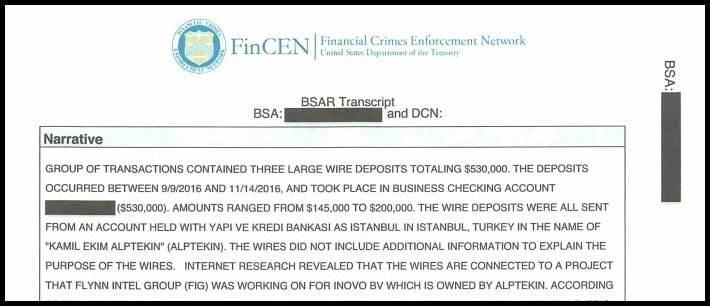
It sounds like McCauley’s claim of a, “90-day project in 45 days” appearing nowhere else in the witness testimony or evidentiary record is as ridiculous as it sounds. A concocted excuse to explain away a glaring inconsistency in the timeline of events. The Mueller team was using the UN meeting with Turkish officials as proof positive the Flynn Intel Group was really working for the Government of Turkey and Alptekin was just a go-between to launder the payments and hide Gen. Flynn and Bijan’s true client. That was hard to justify when everything in evidence indicates Project Confidence was a 90-day contract and the UN meeting took place a little more than a month before Election Day when Flynn needed to have all commercial obligations completed in case candidate Donald Trump won and Flynn was expected to join his transition team. Conveniently McCauley provided a tailor-made explanation.
The next questionable part of McCauley’s testimony relates to the Flynn Intel Group’s lobbying disclosures that were the entire focus of the criminal charges in the case. McCauley testified Bijan had cooked up a scheme to avoid filing FARA with the Dept. of Justice in the hope of evading disclosure FIG was working on behalf of the Government of Turkey. Something McCauley claims he specifically warned Bijan against doing, emphasizing its seriousness.
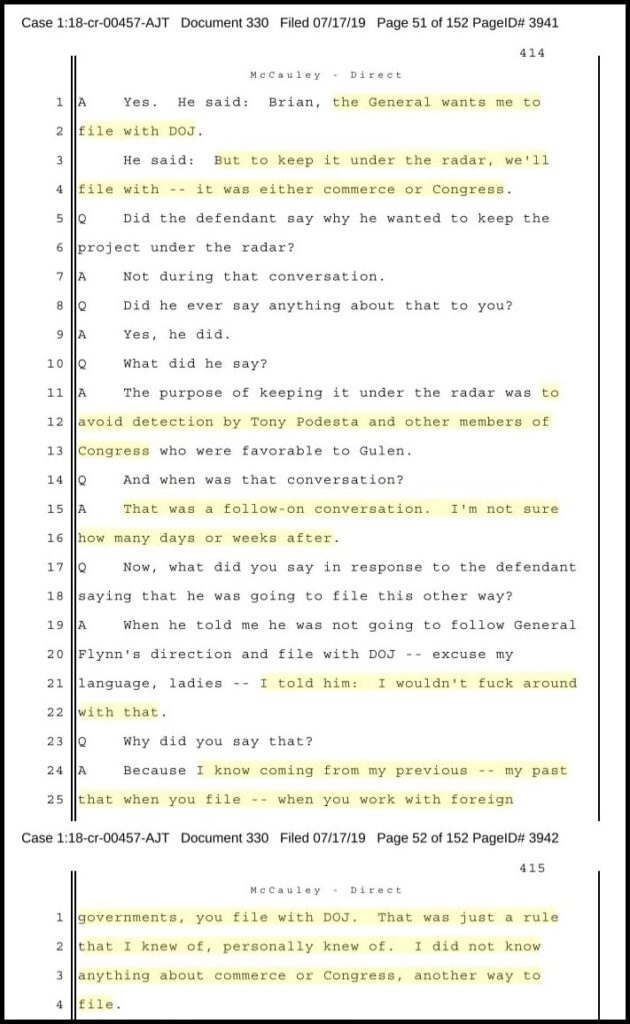
Just to add some clarification because this is the entire crux of the case, if a group is lobbying on behalf of a foreign government in the United States, they are required to file FARA with the DOJ. If a group is lobbying on behalf of a private foreign company or individual, they are required to file under the LDA (Lobbying Disclosure Act) with U.S. Congress as the Flynn Intel Group did in late September 2016. The Mueller Special Counsel prosecutors claim FIG was really working for the Government of Turkey, therefore they conspired to file LDA instead of FARA to hide who they were lobbying on behalf of … diabolical.
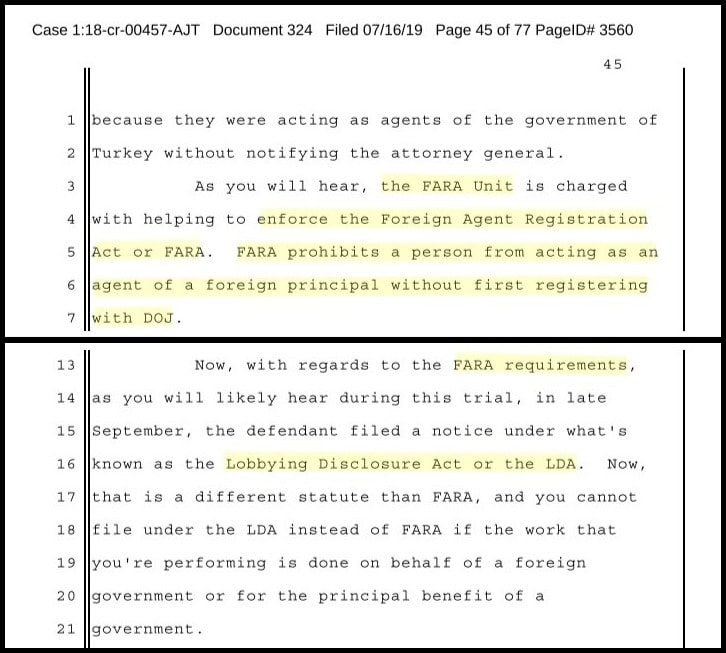
Interestingly, the Government of Turkey had already hired the law firm of Amsterdam & Partners in 2015 to perform the exact same type of investigative and lobbying work related to exposing and publicizing the threat Fethullah Gülen and his FETO organization posed to both the United States and Turkey. Amsterdam had made no effort to avoid filing FARA and openly disclosed those efforts since October 2015. So the Government of Turkey had no reason to pressure the Flynn Intel Group to conceal any lobbying efforts on their behalf or participate in a scheme to avoid filing FARA and FIG had no reason to do so themselves. There was no incentive or motive for the crime the prosecution alleged.
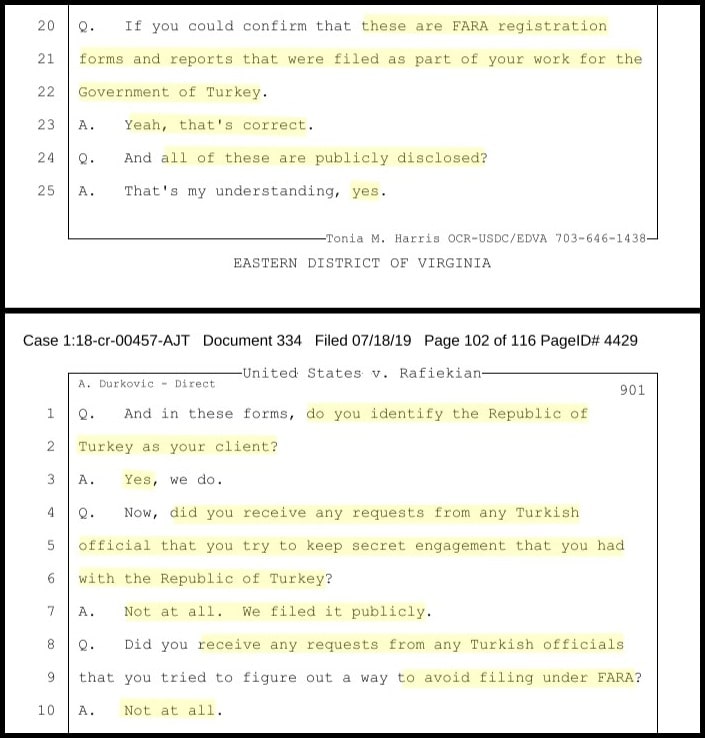
The dates of the Flynn Intel Group LDA filing are interesting and continue to poke holes in McCauley’s story. Per the LDA lobbying registration requirements,
Registration is required no later than 45 days after a lobbyist first makes a lobbying contact or is employed or retained to make a lobbying contact, whichever is earlier, or on the first business day after such if the 45th day is not a business day.
From the Congress.gov website
The LDA the Flynn Intel Group for their contract with Inovo BV by their general counsel Robert Kelley was filed on September 30th with an effective date of September 15th, four days before the UN meeting. Like with most government regulatory requirements, a company is going to take as much time as the regulation requirements allow to file the necessary disclosure forms and is not going to include dates outside the scope of their work in order to limit their risk exposure.
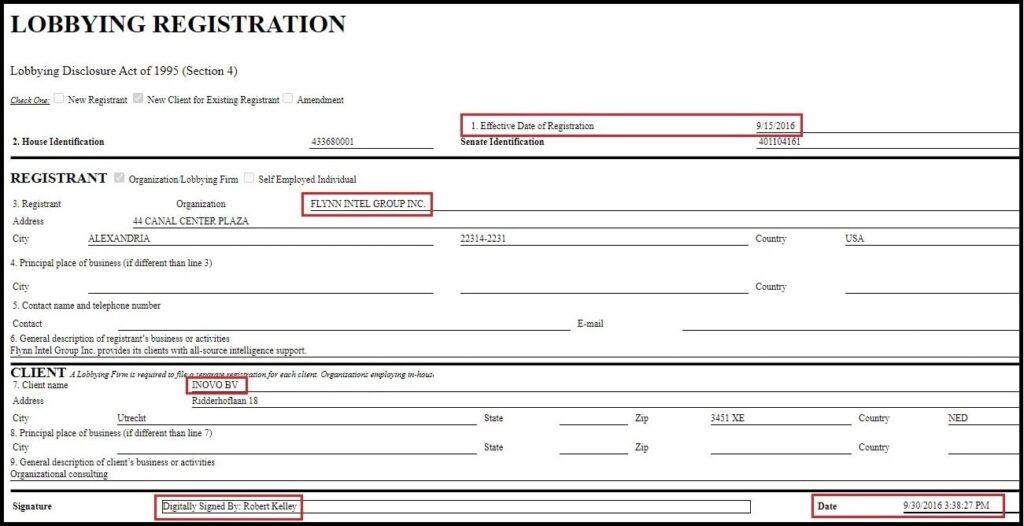
If McCauley is to be believed, FIG filed the form within days of landing the contract and included almost an entire week ahead of their actual engagement date, opening themselves up to undesired public scrutiny. If FIG had landed a contract resulting from the September 19th meeting with the Turkish officials then you would expect to see these filings made sometime in mid to late October. Also, wasn’t the entire point of filing LDA instead of FARA to avoid detection about the true nature of the engagement? All the more reason to delay the filing as long as possible.
The dates make no sense in relation to a contract entered into secretly with the Government of Turkey in late September, but they line up perfectly with a private commercial contract the Flynn Intel Group had been working on since mid to late August.
Let us also consider McCauley’s warning to Bijan when he said, “I wouldn’t f___ around with that” implying he knew from experience FARA was strictly enforced by the DOJ. How true is that? Well according to a 2016 report issued by the DOJ Office of Inspector General, from 1966 to 2015 there had been 7 known criminal FARA cases (one conviction, two guilty pleas, two non-FARA guilty pleas, two dismissals) and no known civil enforcement actions since 1991. Given the amount of lobbying and foreign influence there is in Washington D.C., a longtime DOJ official making this statement in 2016 would have been laughable. It was not until the Mueller Special Counsel weaponized the FARA Division of the DOJ to target Trump’s political allies did it suddenly become “a thing”.
Just to demonstrate how overtly politicized and selective the Mueller team was in bringing FARA cases in their crusade to punish and destroy anyone aligned with President Donald Trump, let’s compare how the case of Flynn Intel Group’s leading competition Tony Podesta and the Podesta Group was handled.
The Podesta Group was a leading Democratic lobbying firm founded by Tony Podesta and his brother John Podesta, the former chairman of the Hillary Clinton campaign and chief of staff to President Bill Clinton. Podesta was actually working for the Alliance of Shared Values; one of the Gulen-affiliated organizations that the Flynn Intel Group was investigating on behalf of Alptekin. Even though Tony Podesta and his associates had committed actual FARA violations, the Mueller team had their cases sent to the Southern District of New York where they were handled as civil not criminal cases. They were allowed to file FARA retroactively six years after the fact and the cases were dropped with no criminal charges.
Even more amazingly, Trump’s former campaign manager Paul Manafort and his business associate Rick Gates, who the Podesta Group had hired to perform the lobbying work for Ukrainian interests they themselves skated on, were criminally prosecuted for those efforts in the Eastern District of Virginia just like the Flynn Intel Group. They were forced to plead guilty to FARA violations, money laundering, and tax evasion related to the Ukrainian lobbying efforts despite previously being investigated by the FBI on the same allegations in 2014 when it was determined no crimes had been committed. The case was only revived when a mysterious photocopied “black ledger” showing secret payments made to Manafort was discovered in Ukraine. The document had been randomly left on the front doorstep of a member of the Ukrainian Parliament and later discovered to be a forgery.
So if McCauley did indeed warn Bijan of the seriousness of failing to file a FARA registry in September or October 2016 despite only seven prosecutions and three convictions over the course of the prior fifty years before Mueller and his minions came along (which I highly doubt), that would indicate he knew something nobody else did. Alternatively and more likely, he committed perjury.
We cannot dismiss the possibility McCauley was planted in the Flynn Intel Group as part of a CIA linked intel operation. As detailed in Lee Smith’s book ‘The Plot Against the President’ and other sources, the CIA and other U.S. Intelligence organizations appeared to have been running operations targeting Gen. Flynn as far back as 2014 when he was still Obama’s Director of the Defense Intelligence Agency (DIA) speaking out publicly against the Administration’s push to secure the Iranian Nuclear Deal (eg. The Joint Comprehensive Plan of Action or “JCPOA”), their number one foreign policy objective, and drawing the ire of CIA Director John Brennan and Director of National Intelligence (DNI) James Clapper.
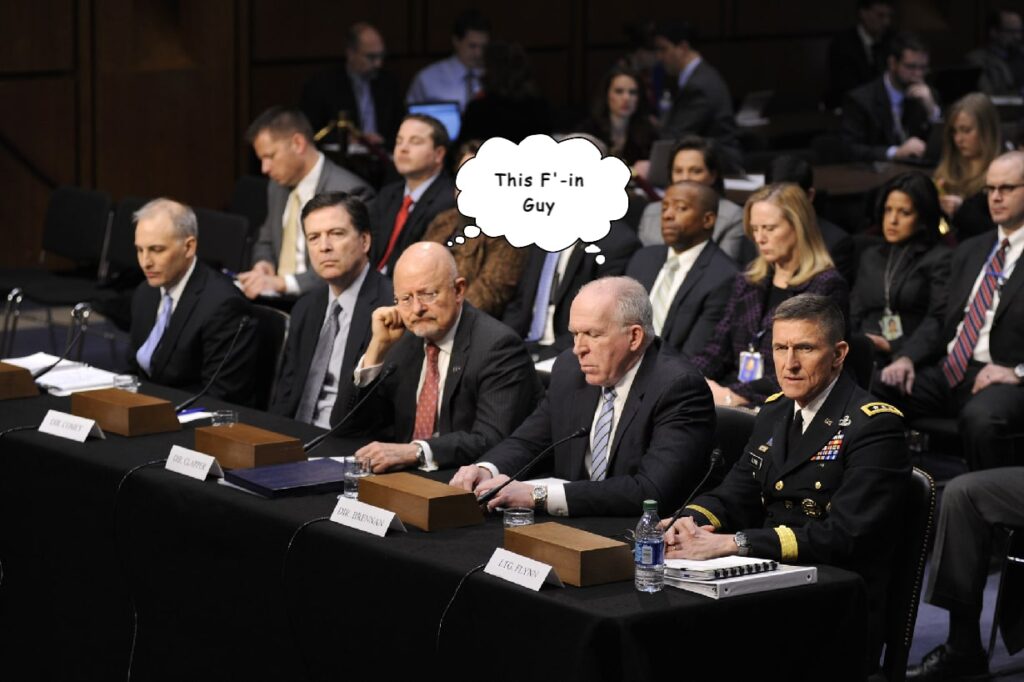
The time the Flynn Intel Group was working on Project Confidence was at the height of the Crossfire Hurricane investigation when the FBI was actively running spies into the Trump campaign, and part of the investigation known as Crossfire Razor was opened to target Gen. Flynn specifically.
After the Flynn Intel Group was put under FARA investigation for Project Confidence (as noted earlier in this article), former CIA Director and FIG advisory board member James Woolsey gave an interview to the Wall Street Journal and later on CNN making wild-eyed claims about that same September 19th meeting. Woolsey claimed he had overheard Flynn and representatives from Turkey discussing a plot to kidnap Fethullah Gülen from his fortified compound in Pennsylvania, presumably to attempt to smuggle him out of the country to be illegally extradited back to Turkey to stand trial.
As recently disclosed documents attached to a letter sent by Sen. Chuck Grassley and Sen. Ron Johnson to the DOJ, the FBI’s Crossfire Hurricane team and DOJ used “open source reporting” of Woolsey’s media interviews as a predicate to open or continue the putative Flynn Intel Group FARA investigation.
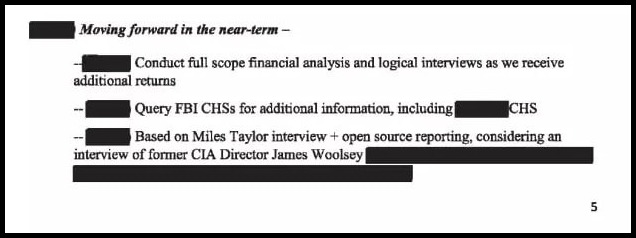
The FBI never seemed to bother to interview the former head of the CIA who claimed to be an eyewitness to a brazen kidnapping plot. They simply relied on media interviews he had done instead. There were no executive privilege hurdles to jump over. Everyone involved in this alleged meeting on the U.S. side was a private citizen. So, it would have required minimal effort to arrange an FBI interview with him and he was already speaking publicly about the allegations.
The most likely reason the FBI never interviewed Woolsey was because his story was so blatantly absurd and easily debunked. They probably knew he would either have to recant his story or possibly face charges for lying to the federal investigators if he were interviewed. It is also very strange Woolsey was never called as a witness or even deposed as part of the trial; even by Bijan’s own defense team.
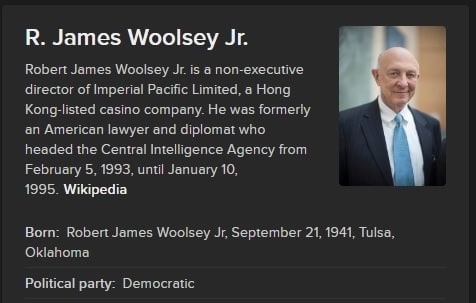
Woolsey’s wild and easily disproven allegations in the early days of the investigation shows that a certain group of former and active intelligence service professionals were very invested in discrediting General Flynn. They must have become fairly desperate to run with such a bizarre story, and Woolsey never said anything about this so-called kidnapping plot until seven months AFTER the meeting in which he supposedly overhead the conservation. It would not be surprising if Woolsey used his position on the FIG advisory board to recommend McCauley for the work on Project Confidence.
McCauley appears to slip up in his testimony about Woolsey in the September 19th meeting with Turkish officials where Woolsey claimed the kidnapping plot was discussed. In Woolsey’s interviews about the meeting, he always claims he walked in late when the meeting was near concluding and he overheard this now infamous conversation of illegal activity on U.S. soil. McCauley seems to initially indicate the meeting started on time despite the prosecutor following up to ask if he was sure (perhaps trying to get him to correct himself in real time) and Woolsey was present from the beginning.
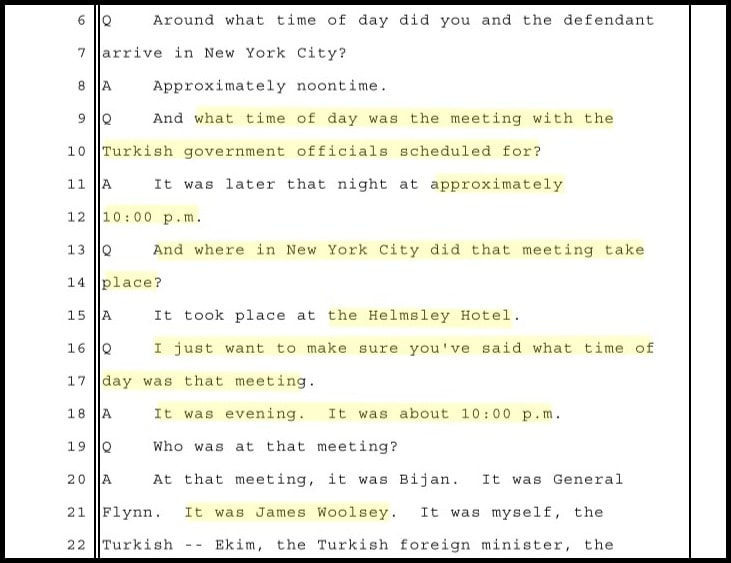
It is also interesting to note he got the location wrong. The meeting took place at Essex House near Central Park, not the Helmsley Hotel two blocks away from the UN Building. Whether that was an honest mistake because he was having issues trying to keep all the details of his story straight, or deliberate for some reason because the actual location posed some type of issue for the prosecution is yet unknown.
McCauley goes on to imply Woolsey was at the meeting from the very beginning, seated right next to Flynn, and present for the opening introductions. Which again contradicts Woolsey’s account in his media interviews where he claims he arrived near the end when the meeting was breaking up.
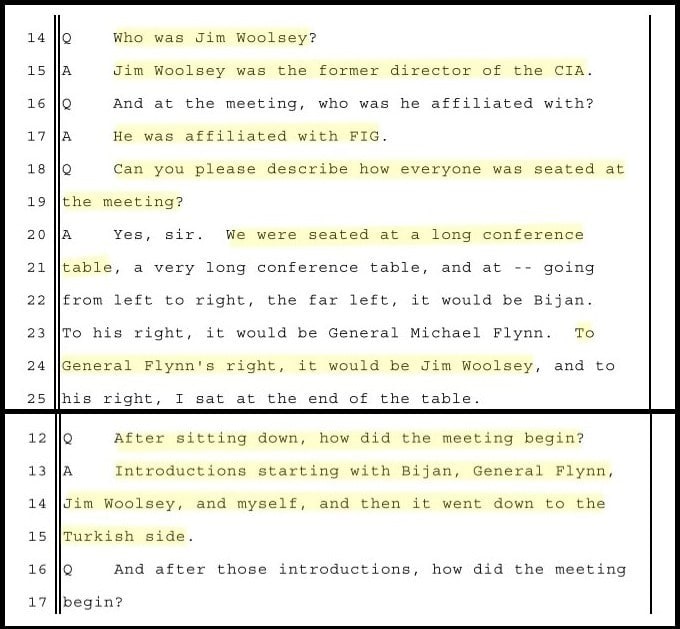
Given how brief the meeting was, it would be hard to get these types of details wrong if you were just recalling them from memory. Not a lot can happen in 25 to 30 minutes which would include time to make all the formal introductions. McCauley also made no mention of anyone brainstorming about kidnapping plots.

At the very end of McCauley’s testimony, the Mueller team prosecutors seemingly go into damage control and circle back to Woolsey’s presence at the meeting. McCauley, perhaps finally realizing he had gone off-script, completely changed his account of Woolsey and the meeting.
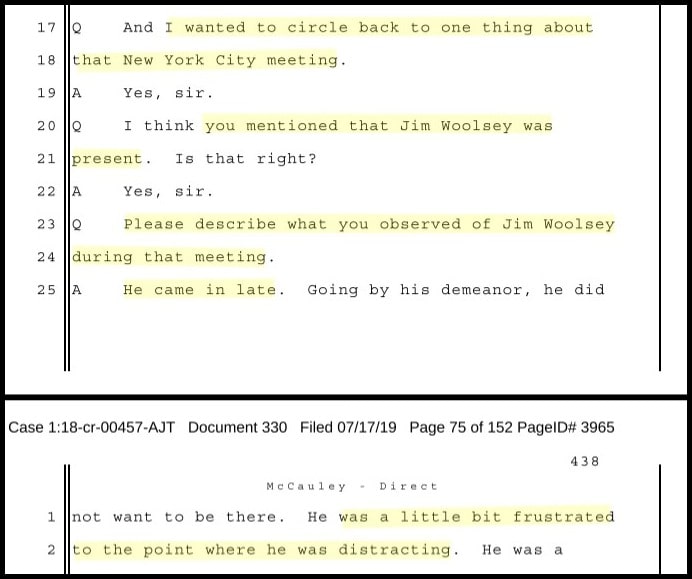
The Mueller team concluded their questioning of McCauley by pressing him yet again and got him to completely change up his timeline of the meeting from a quick in and out meeting that started promptly at 10pm with Woolsey present and seated from the very beginning, to a meeting that was delayed by 30 minutes waiting on Woolsey to arrive and didn’t officially kickoff until 10:30pm, doubling the total amount of time to an hour. Woolsey is now characterized as being highly disruptive and distracted during the meeting, and then missing a good portion of it when he left to go to the restroom. It is hard to believe McCauley is describing the same meeting both times, and quite frankly it is not a credible account given the wholesale changes made at the prompting of the prosecution.
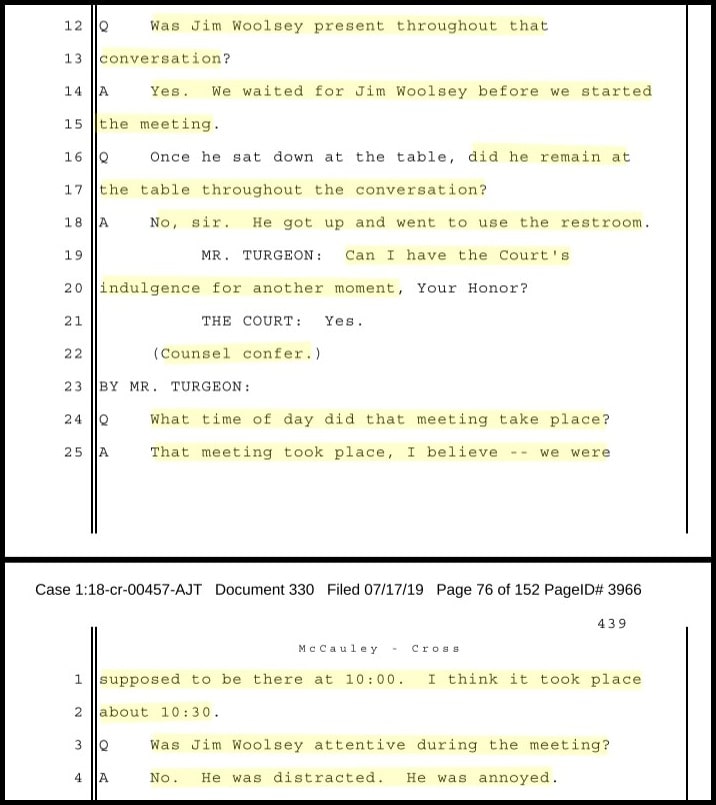
McCauley’s account of the meeting is not credible and neither is the rest of his testimony. If his testimony is disregarded, the rest of the government’s case further falls apart and does not allow Andrew Weissmann, Van Grack, and the other Mueller team prosecutor to present Project Truth and Project Confidence as indistingable and piece together a crime where none actually exists as is their modus operandi.
Thereby giving the 4th Circuit enough of a (yet still absurd) predicate to overturn the Motion of Acquittal even though, in their own words, “no direct evidence” was presented that the Government of Turkey had any role in paying for or directing the work of the Flynn Intel group.
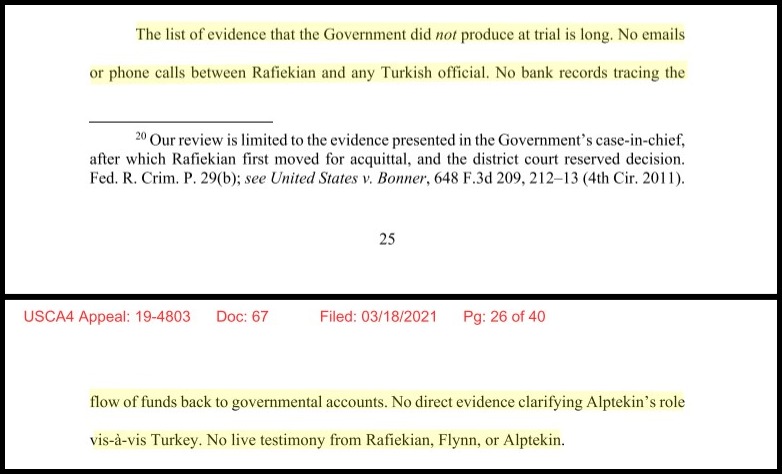

From reading the transcript of the Bijan Kian trial, it does not appear McCauley was the only spy being inserted into the Flynn Intel Group to get intelligence on Project Confidence. Another, more familiar name makes an appearance too, Miles “Anonymous” Taylor.
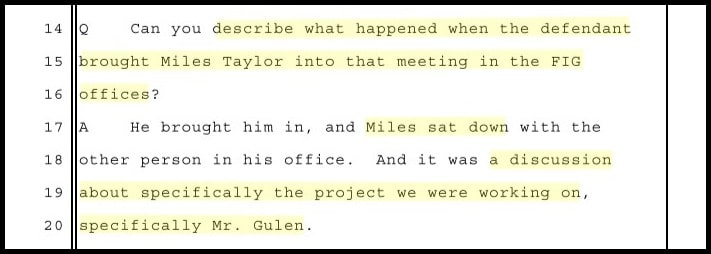
The same Miles Taylor who described himself as a member of “The Resistance” inside the Trump administration and author of the famous New York Times op-ed and subsequent book about chaos in the Trump White House where he greatly overstated his position as a “senior administration official”.
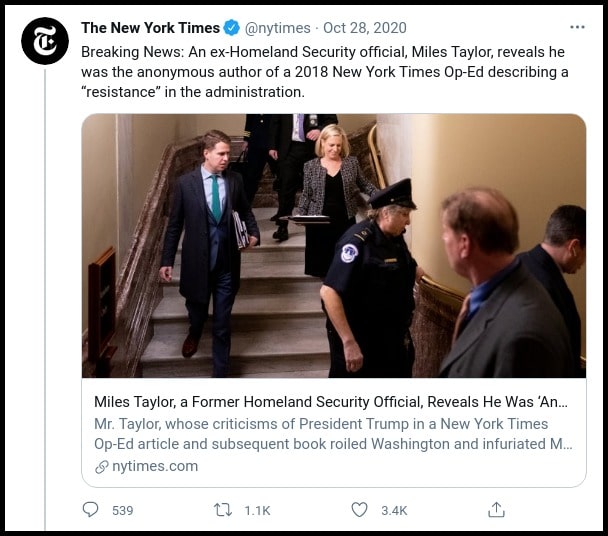
Continue to follow TWP as we will delve into Miles Taylor own role in spying on the Flynn Intel Group in an upcoming article.
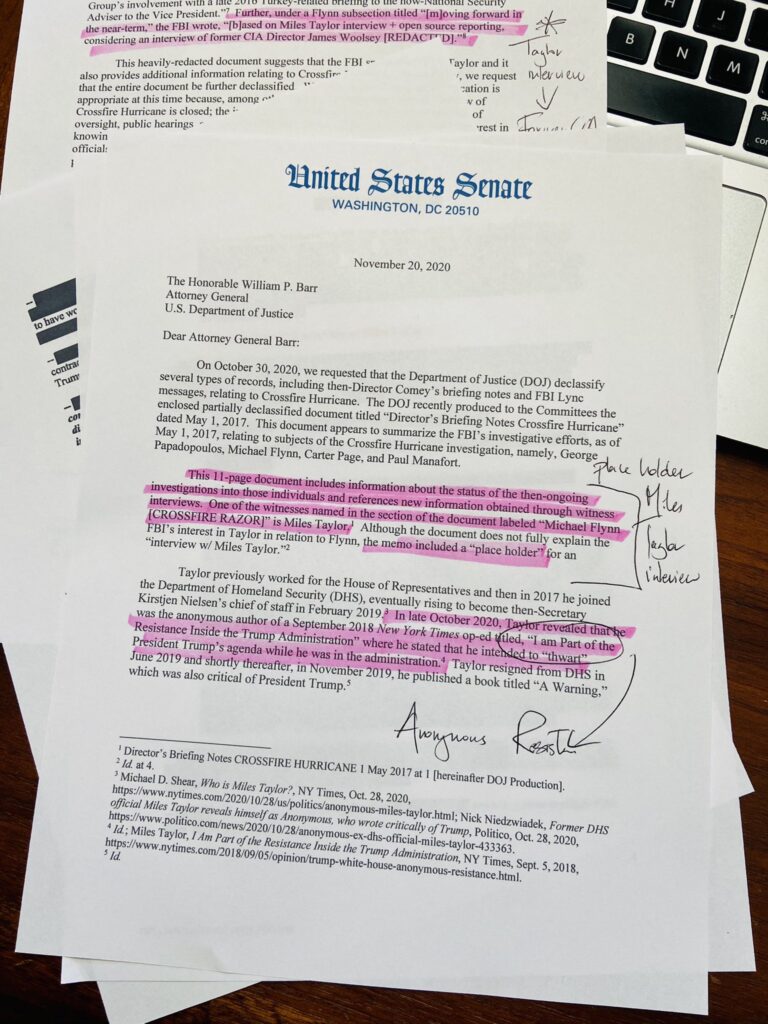
Follow me on Parler @BoumtjeBoumtje
Follow me on Truth Social @AdamCarter



